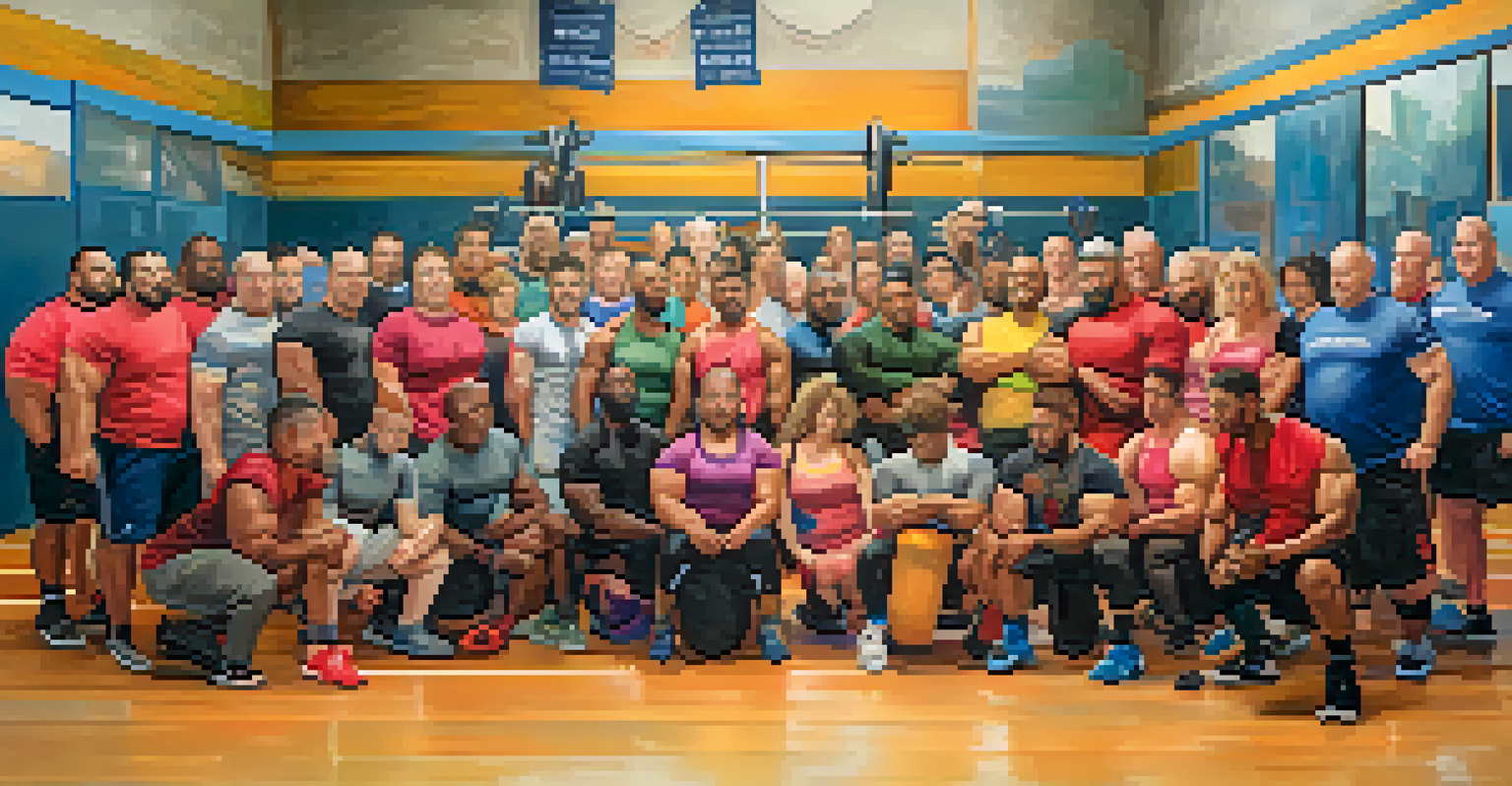Overcoming Injuries: Resilience Lessons from Powerlifting

Understanding the Nature of Injuries in Powerlifting
Injuries in powerlifting can be a harsh reality, often stemming from overtraining or improper technique. Just like a car needs regular maintenance to avoid breakdowns, our bodies require attention and care to perform optimally. Recognizing the signs of fatigue and strain is crucial for any lifter, as ignoring these signals can lead to more severe setbacks.
Strength doesn’t come from what you can do. It comes from overcoming the things you once thought you couldn’t.
For example, a lifter might push through discomfort, believing it's a sign of toughness. However, this mindset can lead to injuries like strains or tears, which can sideline an athlete for weeks or even months. The key is to listen to your body and respect its limits, much like an athlete would heed a coach's advice.
Understanding that injuries are a part of the journey helps to cultivate a more resilient mindset. Instead of viewing an injury as a failure, recognizing it as a learning opportunity can shift your perspective and enhance your future performance.
The Mental Battle: Coping with Setbacks
When faced with an injury, the mental aspect can be just as challenging as the physical recovery. Many powerlifters grapple with feelings of frustration or disappointment, often feeling like they've lost their identity as athletes. This mental battle can be overwhelming, but it's essential to approach it with resilience.

Engaging in mindfulness practices, such as meditation or journaling, can provide a valuable outlet for these emotions. For instance, many lifters find that writing about their experiences helps them process their feelings and refocus their goals. Creating a new narrative about their recovery can transform their mindset from one of despair to one of hope.
Injuries Demand Care and Attention
Recognizing and respecting your body's signals is crucial to prevent injuries in powerlifting.
Moreover, connecting with fellow lifters who have faced similar struggles can foster a sense of community and support. Sharing stories of perseverance can inspire not only personal resilience but also a collective strength that uplifts everyone involved.
Setting Realistic Goals During Recovery
After an injury, it’s crucial to reassess your goals and set realistic expectations for your recovery journey. Just as a marathon runner wouldn’t expect to run a full race right after an injury, powerlifters must acknowledge their body's healing timeline. Setting small, achievable milestones can keep motivation high and instill a sense of accomplishment.
The greatest glory in living lies not in never falling, but in rising every time we fall.
For example, instead of aiming to hit a personal record immediately, focus on regaining mobility or perfecting your technique at lighter weights. This approach allows for a gradual return to strength while minimizing the risk of re-injury. Celebrating these smaller victories, like completing a full week of rehab exercises, reinforces a positive mindset.
As you progress, gradually reintroducing heavier lifts can help rebuild confidence. Each step forward is a testament to your resilience, reminding you that recovery is not a race but a journey worth taking.
Incorporating Rehabilitation into Your Routine
Rehabilitation should be viewed as an integral part of your training regimen rather than a setback. Just as lifters spend hours perfecting their lifts, dedicating time to rehabilitation exercises is key to a full recovery. Incorporating these exercises into your routine can help strengthen the injured area and improve overall functionality.
For instance, if you've injured your shoulder, focusing on mobility and stabilization exercises can enhance your lifting form in the long run. Many lifters find that integrating rehabilitation not only aids recovery but also improves their overall performance. It's about building a stronger foundation for future lifts.
Mental Resilience During Recovery
Coping with injuries involves mental strength, and engaging with the powerlifting community can provide essential support.
Moreover, working with a physical therapist or a knowledgeable coach can provide personalized strategies and accountability. This partnership can ensure that you’re not only recovering effectively but also making informed decisions as you return to powerlifting.
Learning from the Experience: Building Lasting Resilience
Every injury presents an opportunity to learn about your body and your limits. Reflecting on the circumstances surrounding an injury can provide valuable insights into your training habits and lifestyle choices. This self-awareness is a vital component of resilience, equipping you with tools to prevent future injuries.
For example, a lifter might discover that poor nutrition or lack of sleep contributed to their injury. By addressing these underlying issues, they can enhance their overall performance and well-being. This proactive approach transforms the injury experience into a powerful lesson that can inform future training.
Ultimately, the journey of recovery can foster a deeper appreciation for strength and resilience. Embracing the lessons learned from setbacks not only enhances physical performance but also cultivates a mindset of perseverance that extends beyond powerlifting.
The Role of Community in Recovery
The powerlifting community can be a tremendous source of support during recovery from injuries. Sharing your experiences with fellow lifters can provide comfort and encouragement, reminding you that you’re not alone in your journey. Many athletes find strength in collective experiences, creating bonds that enhance their resilience.
Participating in online forums, local meetups, or training sessions can keep you engaged and motivated. Hearing stories from those who have overcome similar challenges can serve as inspiration, reminding you that recovery is possible. For instance, a lifter might recount how they returned stronger than ever after a significant injury, igniting a spark of hope in others.
Set Realistic Goals for Healing
Setting achievable milestones during recovery fosters motivation and helps prevent further injuries.
Additionally, the community can offer practical advice and tips for navigating recovery. Whether it’s sharing rehabilitation exercises or recommending supportive gear, these connections can be invaluable as you work towards your goals.
Embracing the Journey: Finding Strength Beyond Lifting
In the grand scheme of life, injuries often teach us lessons that extend well beyond the gym. Embracing the journey, with all its ups and downs, fosters a deeper understanding of resilience. Recognizing that strength comes in many forms—physical, mental, and emotional—enables lifters to grow in ways they never anticipated.
For many, the recovery process can spark new interests or hobbies unrelated to powerlifting. Engaging in activities like yoga or swimming during recovery can provide cross-training benefits while promoting overall well-being. This holistic approach enriches your life and enhances your powerlifting journey.

Ultimately, by embracing the challenges and lessons that come with injuries, you can emerge stronger and more resilient. Each setback becomes a stepping stone, shaping not just your lifting journey but also your personal growth and development.